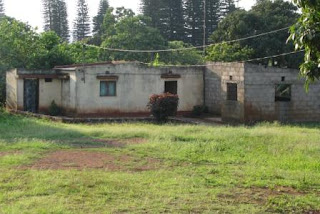We spent a couple of weeks “student teaching” at a secondary school here in Namaacha. I learned more during that time in front of a 10th grade English class than I have during the rest of training. “Eye-opening” is a gross understatement.
 Bulletin boards? Grammar tip posters? Classroom themes?
Bulletin boards? Grammar tip posters? Classroom themes?Classroom decorations have a different name here: graffiti. Moreover, teachers don’t have rooms – students do. Meaning they stay in the same room all day, and teachers travel from class to class university-style carrying all the supplies they’ll need for that class. Doesn’t allow for much creative decorating.
Teacher’s desk? File cabinet? Book shelves? Smart Boards?
Four walls and a chalkboard, if you’re lucky. Desks are wooden benches for two people, or individual metal desks for the nicer schools. Where there are too many students, everyone just sits on the floor.
Overhead projector? Computer?
At first, I thought it was nice that all the classrooms had large windows. Then I realized it’s because lights aren’t always an option. If they can get by without using electricity in classrooms, they do. And sometimes, they have no choice in the matter. I have yet to see a classroom with all windows intact.
Air conditioning? Heating?
I have yet to see a classroom with all windows intact. Students had to relocate during the recent monsoon because there were small lakes where the ceiling leaked. Thankfully, that means you’ve got built-in cross ventilation for when the temperature exceeds 100F.
 Bathrooms?
Bathrooms?I’m not sure about the minimum requirements to be considered a bathroom. Running water? No. Toilets? No. But there are stalls with holes. I suppose that counts.
 Prior to student teaching, we had sessions on classroom management, adolescent development, etc. But we also had classes on avoiding corruption, confronting colleagues who give into corruption, confronting colleagues participating in unacceptable relations with students and convincing students that bribery attempts and cheating are not acceptable. These were taught by current Peace Corps volunteer teachers, who had plenty of first-hand accounts to share. It’s a little scary. On an unrelated note, the guy-girl ratio in my 10th grade class was roughly 8 to 1.
Prior to student teaching, we had sessions on classroom management, adolescent development, etc. But we also had classes on avoiding corruption, confronting colleagues who give into corruption, confronting colleagues participating in unacceptable relations with students and convincing students that bribery attempts and cheating are not acceptable. These were taught by current Peace Corps volunteer teachers, who had plenty of first-hand accounts to share. It’s a little scary. On an unrelated note, the guy-girl ratio in my 10th grade class was roughly 8 to 1.This country has such a dearth of human resources that teachers must attend just one year of training before they end up in a classroom (yes, I realize the irony of my saying that when I’ve had a whole whopping 8 weeks of training myself…). This means teachers can start at age 19 or so. Furthermore, they don’t exactly teach here the way we might expect back home. Pretty much everything is lecture-based. From first grade. No centers. No coloring time. No hands-on learning. No singing. Just lectures. It’s no wonder everyone’s in a hurry to get out of school, by whatever means necessary.
And yet…
I’m strangely excited about the prospect of teaching, certainly more so than I thought I would be (Mom, Kris, all teacher friends, I know you’re laughing right now. I’m aware my brief stint student teaching cannot compare to the stress and frustration of actually being a teacher and I’ll probably be ready to ET [“early termination” in PC lingo] after the first day…but bear with me…). This is teaching at its most basic - no technology, no administration, no parent involvement, just me, a chalkboard, some rice sacks and pens, and 20-30 impressionable young minds. Oooooh. Scary.
That said...I´ve never done this before! I have nothing to go off of! If you have any classroom management policies/activities/other ideas, I welcome them all!




 But it’s okay. You can always just wipe your feet on the doormat.
But it’s okay. You can always just wipe your feet on the doormat.


 The majority of former-Portuguese-owned houses have not seen fresh paint or any kind of upkeep in the past three decades. My house is more recent, and so is somewhere in between:
The majority of former-Portuguese-owned houses have not seen fresh paint or any kind of upkeep in the past three decades. My house is more recent, and so is somewhere in between: My house includes two bedrooms – one for me, and one for the rest of the family. There’s also pantry/living/dining room, and an outdoor semi-covered room for the fire. No microwave; no refrigerator; no stove; no kitchen sink, because there is no running water, plumbing or, for that matter, real kitchen. Oh, and let’s not forget the casa de banho – behind the curtain on the left. It’s essentially non-portable Port-A-Pot that empties into a large pit in the backyard. Toilet paper is thrown out the “window” (hole in the wall) behind the “toilet” (also known as a “chimney”). But hey, I have electricity! Most of the time. We also keep candles close at hand.
My house includes two bedrooms – one for me, and one for the rest of the family. There’s also pantry/living/dining room, and an outdoor semi-covered room for the fire. No microwave; no refrigerator; no stove; no kitchen sink, because there is no running water, plumbing or, for that matter, real kitchen. Oh, and let’s not forget the casa de banho – behind the curtain on the left. It’s essentially non-portable Port-A-Pot that empties into a large pit in the backyard. Toilet paper is thrown out the “window” (hole in the wall) behind the “toilet” (also known as a “chimney”). But hey, I have electricity! Most of the time. We also keep candles close at hand.





